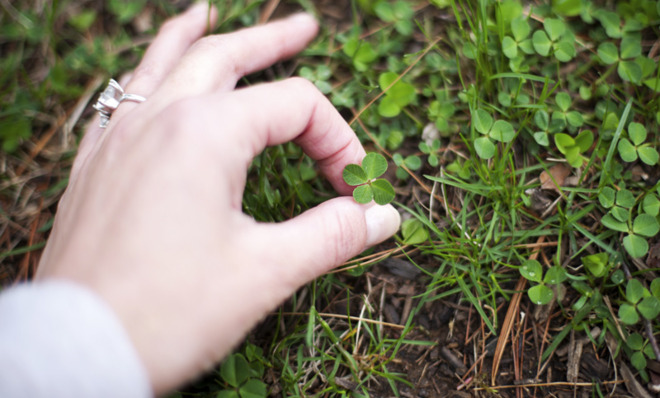4 scientific ways to become luckier
It turns out luck isn't just chance and magic

A free daily email with the biggest news stories of the day – and the best features from TheWeek.com
You are now subscribed
Your newsletter sign-up was successful

It sounds crazy at first: How can you possibly become luckier?
But it turns out luck isn't chance and magic. There's a science behind it.
Richard Wiseman studied very lucky people to figure out what they had in common. In his book, Luck Factor, he explains the four principles you can use to increase luck in your life.
The Week
Escape your echo chamber. Get the facts behind the news, plus analysis from multiple perspectives.

Sign up for The Week's Free Newsletters
From our morning news briefing to a weekly Good News Newsletter, get the best of The Week delivered directly to your inbox.
From our morning news briefing to a weekly Good News Newsletter, get the best of The Week delivered directly to your inbox.
1. Maximize opportunities
It makes intuitive sense: if you lock yourself in your house, how many exciting, serendipitous things are going to happen to you? Not many.
Lucky people create, notice, and act upon the chance opportunities in their lives.
Certain personality types are luckier because they tend to create scenarios that maximize opportunities and thereby increase luck. [Luck Factor]
Who is more lucky?
- People who are extroverted: More time with others, more interesting possibilities.
- People who aren't neurotic: Tense, anxious people are less likely to notice and take advantage of opportunities.
- People who are open to new experiences: If you resist the new, you're probably not going to have many interesting things happen.
Are you an introverted neurotic who only listens to oldies and watches reruns? That's okay.
A free daily email with the biggest news stories of the day – and the best features from TheWeek.com
In the end, it's your behavior that matters. By acting more extroverted, less neurotic, and more open, you can increase luck.
If you do what you've always done, you'll get what you always gotten.
2. Listen to hunches
Lucky people act on their intuitions across many areas of their lives.
Lucky people make successful decisions by using their intuition and gut feelings… Almost 90 percent of lucky people said that they trusted their intuition when it came to personal relationships, and almost 80 percent said it played a vital role in their career choices… About 20 percent more lucky than unlucky people used their intuition when it came to making important financial decisions, and over 20 percent more used their intuition when thinking about their career choices. [Luck Factor]
Lucky people take more steps to boost their intuition as well.
They're more likely to respond to problems by meditating, clearing their mind, coming back to the problem later, or finding a quiet place to think about it.
Again, this isn't something innate or unchangeable. Want to increase luck in your life? Go with your gut more often.
3. Expect good fortune
Plain and simple — it's optimism.
You're more likely to try new things, follow through on opportunities, and have them succeed if you believe they'll work out well.
On average, lucky people thought that there was about a 90 percent chance of having a great time on their next holiday, (and) an 84 percent chance of achieving at least one of their lifetime ambitions…[Luck Factor]
Lucky people have "grit."
Lucky people attempt to achieve their goals, even if their chances of success seem slim, and persevere in the face of failure. [Luck Factor]
What do you need to do? Be optimistic. Persevere. Funny as it sounds, believe you're lucky and you're more likely to actually be lucky.
4. Turn bad luck into good
Lucky people aren't always lucky — but they handle adversity differently than unlucky people.
- Lucky people see the positive side of their bad luck.
- Lucky people are convinced that any ill fortune in their lives will, in the long run, work out for the best.
- Lucky people do not dwell on their ill fortune.
- Lucky people take constructive steps to prevent more bad luck in the future. [Luck Factor]
How do you respond to disappointment?
Giving up, getting gloomy and locking yourself in the house won't help the world offer you better opportunities. Instead, imitate lucky people when things don't go your way.
These principles work:
Not only did Wiseman find that lucky people had these qualities in common, he was able to make unlucky people more lucky by having them apply the ideas.
In total, 80 percent of people who attended Luck School said that their luck had increased. On average, these people estimated that their luck had increased by more than 40 percent. [Luck Factor]
Not only were they luckier, participants also scored higher on life satisfaction after trying Wiseman's principles.
So making yourself lucky can also make you happy. Now that's good fortune.
And if you enjoyed this post, share it with friends. We could all use some good luck. :)
Join 45K+ readers. Get a free weekly update via email here.
More from Barking up the Wrong Tree
-
 ‘The West needs people’
‘The West needs people’Instant Opinion Opinion, comment and editorials of the day
-
 Filing statuses: What they are and how to choose one for your taxes
Filing statuses: What they are and how to choose one for your taxesThe Explainer Your status will determine how much you pay, plus the tax credits and deductions you can claim
-
 Nan Goldin: The Ballad of Sexual Dependency – an ‘engrossing’ exhibition
Nan Goldin: The Ballad of Sexual Dependency – an ‘engrossing’ exhibitionThe Week Recommends All 126 images from the American photographer’s ‘influential’ photobook have come to the UK for the first time